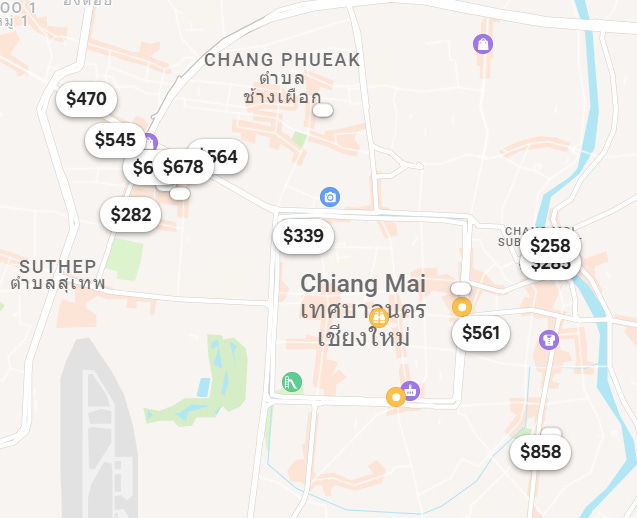Chiang Mai, Thailand: Nomad Deep Dive
Chiang Mai is a popular destination for digital nomads seeking a balance of culture, affordability, and community. Known for its rich traditions and laid-back lifestyle, the city is home to over 300 temples and offers a slower pace than bustling Bangkok. Chiang Mai’s deep-rooted Buddhist culture is visible everywhere, from spiritual retreats to daily life, and its artistic scene is thriving, with regular festivals like the Yi Peng Lantern Festival and Songkran adding to the city's charm. Landmarks such as Wat Phra That Doi Suthep and the Old City highlight the city's historical importance, while festivals like the Flower Festival showcase Thai traditions.
One of Chiang Mai’s greatest attractions is its affordability. Digital nomads can live comfortably for under $1,000 a month, making it one of the most budget-friendly hubs globally. Renting a one-bedroom apartment costs between $250-600/month, and daily expenses remain low, with street food priced at $1-3 per meal and dining in restaurants costing $5-10. Groceries are similarly affordable, running around $100-150/month. Transportation is cheap as well, with motorbike rentals costing about $60-100/month, and local transport options like songthaews are available for around $1 per ride. Utilities, including internet, average $50-100/month, with internet speeds between 100-300 Mbps, making it easy to stay connected. Here is a look at monthly Airbnb rates near Chiang Mai city center:
In terms of safety, Chiang Mai is considered a safe destination, with low levels of violent crime. Petty theft can occur in crowded tourist areas, but such incidents are rare. While police presence isn’t as visible as in Western cities, services are reliable, particularly in urban areas. Healthcare is another highlight, with Chiang Mai offering high-quality, affordable medical services. Private hospitals like Chiang Mai Ram Hospital and Bangkok Hospital Chiang Mai are popular among expats for their English-speaking staff and excellent care, with consultations starting at around $20. Many nomads opt for private health insurance, which typically costs between $50-200/month.
Chiang Mai’s weather is tropical, with a pleasant cool season from November to February, when temperatures range from 20-30°C. However, the summer months can be hot and humid, and the rainy season from May to October brings heavy downpours and high humidity. The burning season, from February to April, poses a significant downside due to poor air quality caused by agricultural crop burning.
For digital nomads, visa options in Thailand are fairly flexible. Most nomads enter with a 60-day tourist visa, extendable by 30 days, or utilize the 30-day visa exemption with a similar extension. Longer-term options include the Education Visa, which allows stays while studying Thai or other subjects, and the Thailand Elite Visa, a premium long-term visa for those willing to invest in an expensive package.
Chiang Mai is also easy to reach, thanks to Chiang Mai International Airport (CNX), which offers numerous domestic and international flights, especially to other Southeast Asian destinations. The airport’s relaxed, small-scale experience is another plus for many travelers.
Chiang Mai’s digital nomad community is one of the strongest in the world, with regular meetups and workshops fostering a close-knit network of entrepreneurs, freelancers, and remote workers. With over 200 co-working spaces, such as Punspace and Hub 53 (pictured below), offering affordable monthly rates ($90-150), and a friendly atmosphere, Chiang Mai remains a top destination for remote workers.
In terms of time zone, Chiang Mai operates on Indochina Time (UTC+7), which works well for those collaborating with Asia and Europe, though it can be challenging for those working with the Americas due to a 12-15 hour time difference.
In conclusion, Chiang Mai combines affordability, culture, and a thriving digital nomad community, making it a standout choice for remote workers seeking a blend of tradition and convenience.





